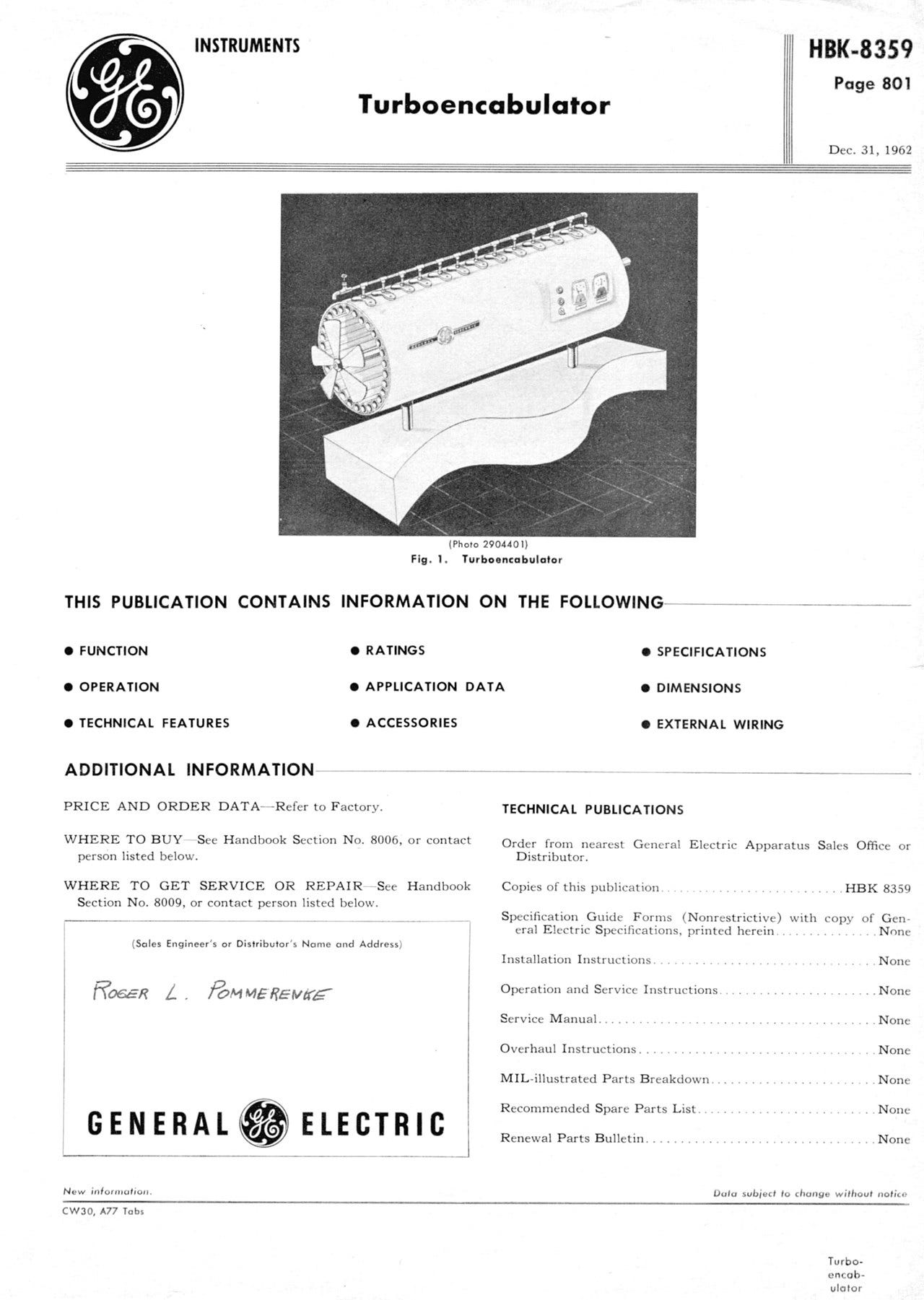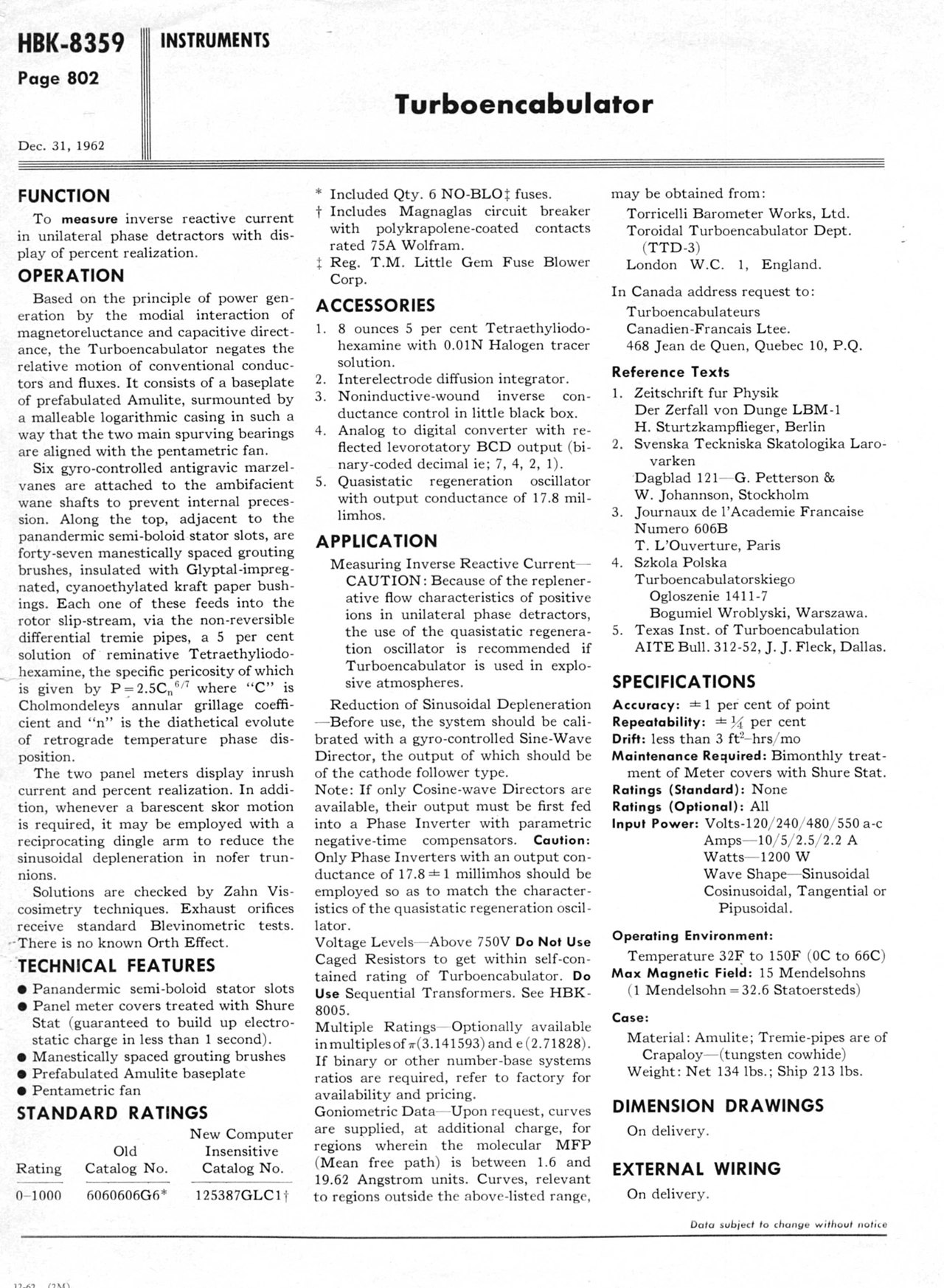The Turboencabulator Age
Not long ago, I was somewhat masochistically watching a one-minute video of a salesperson from a tech company explaining the benefits of their technology. In an impressive sprint, the speaker machine-gunned 16 buzzwords—one every roughly 4 seconds: enable, proactively, leverage, engage, low-hanging fruit, win-win and many others I won’t put here so I don’t start feeling nauseous (again). The whole structure of what this person said was a massively amorphous, unnecessarily complex ball of nothingness—in short, it made, end to end, absolutely no sense. The speaker never answered the question, and I doubt it made anyone consider going and buying their technology anytime soon. It had strong Zombo vibes. As it happens, no one really cared about the pointlessness of what this person said. In an ideal world, the first comment in that video would’ve been a caustic: “Excuse me, what the hell was all that nonsense?”. In this world we live in, there was even some mild celebration to the babble—not surprisingly written with babble as well—which a part of me dies to believe it was sarcastic.
But, ok, let’s just forget about the buzzwords today. They are not the problem—or, they are, but not the core of it1. I have bored myself —and have probably stupefied you as well—complaining about buzzwords. The underlying problem is something else. Mainly, the lack of care for constructing concise meaning. Feels as if saying only a few precise words, for just a few seconds and TO THE ACTUAL POINT would’ve become something socially unacceptable, so we are urged to adornate our phrases with filler up to a level where the management/business/techno speak becomes the main thing and the true meaning gets buried under a pile of hyphenated rubbish.
The question is: why? To sound smart? To get out from the situation as soon as possible with the least amount of damage? It’s actually curious: the speakers/writers either have a meaning and cannot express it, or they inadvertently say something else, or they are indifferent as to whether their words mean anything or not.
Years ago, a fictional electromechanical device called the Turboencabulator became a famous joke among engineers. Originally written by a British graduate student called John Hellins Quick (1923–1991) and published by the British Institution of Electrical Engineers in their Students' Quarterly Journal in 19442, it represented the satirical marriage of technobabble and empty marketing, with memorable results. Throughout the years, other tech companies picked it up and continue the tradition. Here’s the datasheet from GE for your reference:
And its specs:
Because content is king, here’s a promotional video of the turboencabulator (also known as retroencabulator) from Rockwell Automation, a competitor of GE in the high-growth, data-driven, highly disruptive turboencabulator market:
Here’s a transcript of this piece of comedy gold:
Here at Rockwell Automation’s world headquarters, research has been proceeding to develop a line of automation products that establishes new standards for quality, technological leadership, and operating excellence. With customer success as our primary focus, work has been proceeding on the crudely conceived idea of an instrument that would not only provide inverse reactive current, for use in unilateral phase detractors, but would also be capable of automatically synchronizing cardinal grammeters. Such an instrument comprised of Dodge gears and bearings, Reliance Electric motors, Allen-Bradley controls, and all monitored by Rockwell Software is Rockwell Automation’s "Retro Encabulator".
Now, basically the only new principle involved is that instead of power being generated by the relative motion of conductors and fluxes, it’s produced by the modial interaction of magneto-reluctance and capacitive diractance. The original machine had a base plate of prefabulated amulite, surmounted by a malleable logarithmic casing in such a way that the two spurving bearings were in a direct line with the panametric fan.
The lineup consisted simply of six hydrocoptic marzel vanes, so fitted to the ambifacient lunar wane shaft that side-fumbling was effectively prevented. The main winding was of the normal lotus o-deltoid type placed in panendermic semi boloid slots of the stator, every seventh conductor being connected by a non-reversible tremie pipe to the differential girdle spring on the ‘up’ end of the grammeters. Moreover, whenever fluorescence score motion is required, it may also be employed in conjunction with a drawn reciprocation dingle arm to reduce sinusoidal depleneration.
The Retro Encabulator has now reached a high level of development, and it’s being successfully used in the operation of milford trunnions. It’s available soon; wherever Rockwell Automation products are sold.
And here’s a link to the original one which has an even more hilarious ending (hear the laughs at the end as the presenter holds the price tag with a priceless poker face.)
Reality has made the turboencabulator sound like a plausible product these days. The line between satire and “serious” marketing has thinned more than we should feel comfortable with.
In his short essay titled Politics and the English Language (1946)3, George Orwell argues that there is a trend to think in poor English because the language is in decline; and, as the language declines, "foolish" thoughts become even easier, reinforcing the original cause:
A man may take to drink because he feels himself to be a failure, and then fail all the more completely because he drinks. It is rather the same thing that is happening to the English language. It becomes ugly and inaccurate because our thoughts are foolish, but the slovenliness of our language makes it easier to have foolish thoughts.
Basically: if you speak dumb language, your thinking becomes dumber which makes you spout even dumber language and so on. Orwell also discusses "pretentious diction" and "meaningless words". "Pretentious diction" is used to make biases look impartial and scientific, while "meaningless words" are used to stop the reader from seeing the point of the statement. According to Orwell: "In certain kinds of content, it is normal to come across long passages which are almost completely lacking in meaning4."
Years ago, I was reviewing a formal proposal for a customer. As I was going through the various pages, I remember feeling dizzy on the overall business babble. It was not only the buzzwords but also the childish aggrandizement, the cherry-picked metrics, the abuse of bold letters, the absurdity of the whole thing which —masochistically, again— I read from cover to cover. Of course, I had to say something—like, come on, are you serious? Long story short, not only the wording stayed, but this issue motivated a longer chat with the sales manager who said one of the most oddly flattering phrases has anyone said to me:
— Ignacio, if our sales material depended on you, we would sell absolutely nothing
https://digital-library.theiet.org/content/journals/10.1049/sqj.1944.0033
https://www.orwellfoundation.com/the-orwell-foundation/orwell/essays-and-other-works/politics-and-the-english-language/
The original line uses the word “writing” instead of “content”, which I altered for clarity.



